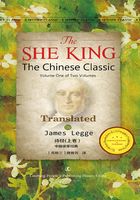
TS'AE PIN
1 She gathers the large duckwood,
By the banks of the stream in the southern valley.
She gathers the pondweed,
In those pools left by the floods
2 She deposits what she gathers,
In her square baskets and round ones;
She boils it,
In her tripods and pans.
3 She sets forth her preparations,
Under the window in the ancestral chamber.
Who superintends the business?
It is [this] reverent young lady.


Ode 4. Narrative. THE DILIGENCE AND BEVERENCE OF THE YOUNG WIFE OF AN OFFICER, DOING HER PART IN SACRIFICIAL OFFERINGS. The ancient and modern interpreters are to some extent agreed in their views of this ode.Wherein they differ will be noticed under the 3d stanza.
St. 1. 于以,—see on ode 2. The p'in belongs to the same species of aquatic plants as the 荇菜 of i. I.The Pun-ts'aou says there are three varieties of it:—the large, called p'in; the small called 浮萍; and the middle, called 荇菜. Maou makes the p'in the large variety, while Choo and some others make it the 3d.Yen Ts'an observes that the p'in may be eaten; but not the fow p'ing. If the p'ing could not be eaten, it is not likely, he says, it would be gathered, like the plant here, to be used in sacrifice. Thep'in is, probably, the lemna trisulcu. The s'aou is the tussel-pondweed,—ruppia rostella. Both by Maou and Choo it is called聚藻, from the strings of tufts in which it grows.Williams erroneously translates 行潦 by 'a torment'.潦 is, primarily, the 'appearance of great rain'; then 行潦, is the rain left after a heavy fall of it, and by the flooded streams, on the roads and plains
St. 2. K'wang and keu are distinguished as in the translation. They were both made of bamboo.湘 is defined by 烹, 'to boil'. The vegetables were slightly boiled and then pickled, in order to their being presented as sacrificial offerings. The 錡 is distinguished from the 釜, as 'having feet'.
St. 3. 奠=置, 'to place', 'to set forth'. 室 may be taken as=宮, =廟, so that 宗室 simply= 'the ancestral temple'. More particularly, however, the phrase may='the ancestral chamber', a room behind the temple, specially dedicated to the 大宗, or 'ancestor of the great officer', whose wife is the subject of the piece.The princes of States were succeeded, of course, by the eldest son of the wife proper. Their sons by other wives (庶子) were called 'other sons (別子)'.

